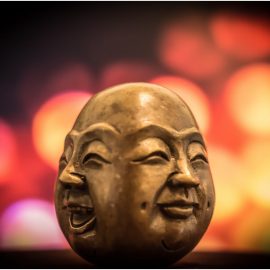

This article is an excerpt from the Shortform book guide to "The Fifth Agreement" by Don Miguel Ruiz. Shortform has the world's best summaries and analyses of books you should be reading.
Like this article? Sign up for a free trial here .
Do you know what acceptance means in the context of Toltec enlightenment? How does it relate to personal freedom?
Acceptance of “what is” is the second stage of Toltec enlightenment. In The Fifth Agreement, don Miguel Ruiz and don Jose Ruiz discuss what acceptance means in this context and how to practice acceptance to reclaim personal freedom.
Continue reading to learn what acceptance means in Toltec philosophy.
What Acceptance Means to the Toltec
To reclaim our freedom, the Toltec say, we must replace judgment with acceptance. In other words, we must stop demanding everyone be “better” and just love them as they are. To love ourselves as we are, and experience the world as it is. In short, the second stage of Toltec enlightenment involves learning to accept what’s already here instead of focusing on how flawed it all is.
During the second stage, the naguals explain, we become aware of the ways our beliefs harm us and begin to disconnect from the mirage. We begin to doubt that the mirage is truly “the real world,” and awaken to the many small ways in which the beliefs we grew up with manifest as harm. We make adjustments to the way we respond to, think about, and see ourselves, others, and the world. We start to see what’s actually here, instead of what’s not here. This is part of what acceptance means.
It won’t be easy; we’re struggling to shift to a perspective that’s almost the antithesis of what we’ve been taught. We’ll have to resist the impulse to judge others for “missing the point,” or to hold ourselves to new rules. If we keep at it, though, the naguals say we’ll be rewarded with emotional stability, self-love, and the ability to be present, engaged, and alive in every moment.
(Shortform note: In A New Earth, Eckhart Tolle explains that this process of awakening is irreversible—once you start to doubt, he says, you never return to a total, blind acceptance of the mirage. Whether you manage the “full” awakening or not, you’ll gain some degree of permanent freedom simply through your awareness that the status quo is wrong: You’ll naturally stop holding yourself and others to rules you know aren’t as set in stone as you once thought.)
According to the naguals, the fundamental truth about what acceptance means is this: You are not broken or wrong. You don’t need to change in order to matter. Things don’t have to make sense, or be right, or be good. There are no rules to living “correctly” because there isn’t a “correct” way to live. All you’re required to do is exist, live, and experience the journey. All other requirements, obligations, and expectations are a distraction, a social construct, or a mirage.
As such, the Toltec say: Stop punishing and abusing yourself—be whoever you are today, and let bygones be bygones. Forgive yourself; nobody else can give you permission to enjoy the time you have left. Finally, believe in yourself—in your capacity to know what you like and don’t like, want and don’t want. No belief is more important.
Shortform Commentary: What Does Acceptance Mean?
Other philosophies drive at this core principle—accepting things as they are—from different directions, but come to remarkably similar conclusions. For example, the Tao Te Ching is very direct. It tells us that the workings of the universe aren’t truly comprehensible or explainable and that we don’t have to know, label, or understand anything in order to experience it—or even to enjoy it. In fact, it’s often best not to stress about the whys and hows because what’s happening will happen anyway. What is, is, and that’s okay.
Like the Toltec, other philosophies also recommend showing yourself this same acceptance. For example, the Bhagavad Gita suggests that in order to find ourselves, we must discard every outside influence: Our search for peace and righteousness, our selfish desires, and our indulgence in sloth and despair. It’s the false “reality” created by our senses that gives rise to those things, not the true self at our core. To be yourself, discard everything you think you’re supposed to be and just focus on being what you already are.
Similarly, the Buddha’s prescription is to combine awareness with compassion, and mindfulness with tenderness. In other words, don’t punish yourself for living, or worry about how “well” you’re doing it; just live. When you hurt, yearn, or enjoy, Buddha explains, notice that and respond with acceptance and compassion. Don’t judge, evaluate, or compare; it’s natural to suffer, to want things, and to enjoy yourself. None of that is wrong; those are equally valuable pieces of your experience.In the same vein, Zen master Seng-tsan said that to be free is to live without worrying about imperfection. Imperfection is a natural aspect of all that exists, so just accept yourself and others without judgment. We are what we are, and that’s okay, too. Becoming perfect is as unnecessary as it is impossible; you don’t need perfection to experience joy.
Once we figure out what acceptance means and begin to practice it, we are on the path to enlightenment as the Toltec understand it.

———End of Preview———
Like what you just read? Read the rest of the world's best book summary and analysis of Don Miguel Ruiz's "The Fifth Agreement" at Shortform .
Here's what you'll find in our full The Fifth Agreement summary :
- The five “agreements” to make with yourself that adjust your outlook
- How to rediscover your true self and recapture the freedom you felt as a child
- A five-step process to escape the mirage of “the real world”






